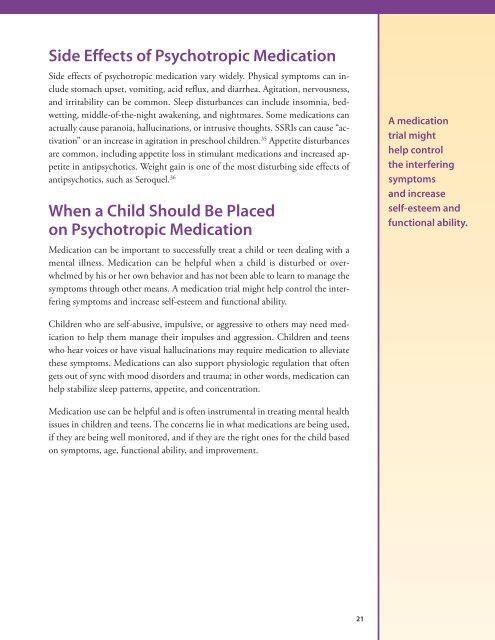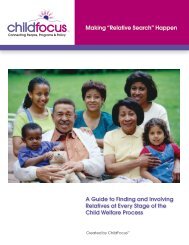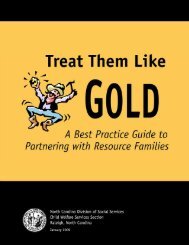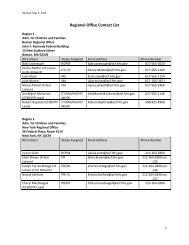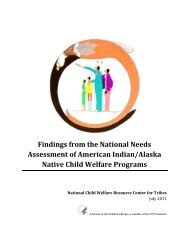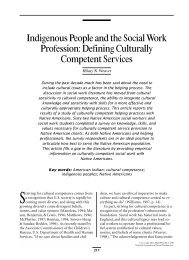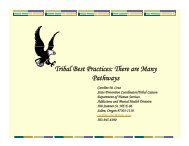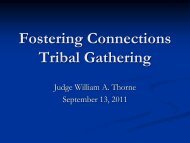Psychotropic Medication and Children in Foster Care - American Bar ...
Psychotropic Medication and Children in Foster Care - American Bar ...
Psychotropic Medication and Children in Foster Care - American Bar ...
Create successful ePaper yourself
Turn your PDF publications into a flip-book with our unique Google optimized e-Paper software.
Side Effects of <strong>Psychotropic</strong> <strong>Medication</strong>Side effects of psychotropic medication vary widely. Physical symptoms can <strong>in</strong>cludestomach upset, vomit<strong>in</strong>g, acid reflux, <strong>and</strong> diarrhea. Agitation, nervousness,<strong>and</strong> irritability can be common. Sleep disturbances can <strong>in</strong>clude <strong>in</strong>somnia, bedwett<strong>in</strong>g,middle-of-the-night awaken<strong>in</strong>g, <strong>and</strong> nightmares. Some medications canactually cause paranoia, halluc<strong>in</strong>ations, or <strong>in</strong>trusive thoughts. SSRIs can cause “activation”or an <strong>in</strong>crease <strong>in</strong> agitation <strong>in</strong> preschool children. 35 Appetite disturbancesare common, <strong>in</strong>clud<strong>in</strong>g appetite loss <strong>in</strong> stimulant medications <strong>and</strong> <strong>in</strong>creased appetite<strong>in</strong> antipsychotics. Weight ga<strong>in</strong> is one of the most disturb<strong>in</strong>g side effects ofantipsychotics, such as Seroquel. 36When a Child Should Be Placedon <strong>Psychotropic</strong> <strong>Medication</strong><strong>Medication</strong> can be important to successfully treat a child or teen deal<strong>in</strong>g with amental illness. <strong>Medication</strong> can be helpful when a child is disturbed or overwhelmedby his or her own behavior <strong>and</strong> has not been able to learn to manage thesymptoms through other means. A medication trial might help control the <strong>in</strong>terfer<strong>in</strong>gsymptoms <strong>and</strong> <strong>in</strong>crease self-esteem <strong>and</strong> functional ability.A medicationtrial mighthelp controlthe <strong>in</strong>terfer<strong>in</strong>gsymptoms<strong>and</strong> <strong>in</strong>creaseself-esteem <strong>and</strong>functional ability.<strong>Children</strong> who are self-abusive, impulsive, or aggressive to others may need medicationto help them manage their impulses <strong>and</strong> aggression. <strong>Children</strong> <strong>and</strong> teenswho hear voices or have visual halluc<strong>in</strong>ations may require medication to alleviatethese symptoms. <strong>Medication</strong>s can also support physiologic regulation that oftengets out of sync with mood disorders <strong>and</strong> trauma; <strong>in</strong> other words, medication canhelp stabilize sleep patterns, appetite, <strong>and</strong> concentration.<strong>Medication</strong> use can be helpful <strong>and</strong> is often <strong>in</strong>strumental <strong>in</strong> treat<strong>in</strong>g mental healthissues <strong>in</strong> children <strong>and</strong> teens. The concerns lie <strong>in</strong> what medications are be<strong>in</strong>g used,if they are be<strong>in</strong>g well monitored, <strong>and</strong> if they are the right ones for the child basedon symptoms, age, functional ability, <strong>and</strong> improvement.21


